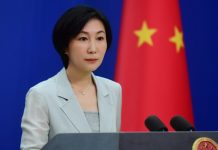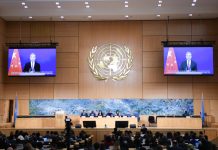
Recently, Ju Li, a novelist based in Xinjiang Uygur Autonomous Region, launched his newest book Xingfu Shenghuo (Better Off). In his work, which covers the anti-poverty campaign in Xinjiang, Ju delves into the causes of poverty, how to balance the relationship between short-term interests and long-term ones, how to improve the competence of officials involved in this campaign, and how to consolidate national unity, as Xinjiang is home to all of China’s 56 ethnic groups.
Empowerment
Ju’s novel had a national background. Between 2013 and 2020, more than 3 million officials were dispatched as first Party secretaries and resident officials to poor villages, fighting on the frontlines of poverty alleviation alongside nearly 2 million township officials and millions of village officials. The novel is meant to tell the stories of these “first Party secretaries” through the lens of its protagonist Ren Leshui.
Appointed first Party secretary of a small village, Ren, together with three colleagues from the Uygur, Kazak and Han ethnic groups, carries out targeted poverty alleviation and helps local villagers find their way out of poverty.
However, they soon realize that some villagers rely heavily on government subsidies and never develop the skills to provide for themselves. The majority of the villagers seem to be waiting, as if poverty at some point will just vanish into thin air.
Ren thought long and hard about how to best help the villagers. In his eyes, their frustration in life tended to demoralize them. “These villagers have been subject to poverty for a long time. Living a miserable life wholly swallows up their passions and talents, eventually leading them to just stick with poverty,” he told his colleagues. Ren figures that if villagers were to get opportunities to earn a decent living on their own, this would encourage them to pursue a better life.
The protagonist employs mechanisms that can help spark a change in people’s attitudes. He also works tirelessly to promote insurance programs as part of efforts to reduce the burden of medical expenses for poor people.
A local writer
The book’s author Ju was born in Aksu Prefecture, Xinjiang. He started writing at the age of 47, feeling his life and work experiences in the region had laid the solid foundation for him to embark on the craft. For this book, he tagged along with resident teams supporting the poverty alleviation efforts and visited more than 100 villages to interview locals.
Ju’s creation is driven by a strong sense of responsibility and mission. Xinjiang is located in the northwest of the country at the crossroads of Central Asia and East Asia; to this day, the region remains a mystery to many outsiders. The fight against separatism in Xinjiang was once fierce. Thousands of terrorist attacks happened there between 1990 and 2016, claiming the lives of large numbers of innocent people and hundreds of police officers. But since then, remarkable results have been achieved in the battle against separatism, extremism and terrorism and Xinjiang has at long last found peace and stability.
Nevertheless, Western accusations of “forced labor” and “genocide” continue to tear down the region’s—and China’s, for that matter—reputation on the global stage. So Ju decided to use his pen and record real Xinjiang life, aiming to help the world better understand and empathize with the beautiful and peaceful place that is Xinjiang today. After all, as is the case with Xinjiang’s villagers once living under the poverty line: Once the mindset changes, everything on the outside will change along with it.
The reality
From 2013 to 2020, China lifted nearly 100 million rural residents living under the country’s current poverty line—the per-capita annual income of 2,300 yuan ($348) at 2010 prices—out of poverty. In achieving this, China has met the poverty eradication target outlined in the UN 2030 Agenda for Sustainable Development 10 years ahead of schedule.
But what are some of the root causes of poverty? As Ju’s novel noted: The lack of (good) education, the lack of (good) jobs and/or job growth, the lack of infrastructure; these are just a few examples.
Yet poverty alleviation in Xinjiang came with an even more elaborate set of challenges. Impoverishment was mainly rampant in south Xinjiang. The ecological environment there is fragile and weak industrial development often leads to limited supplies. Moreover, local authorities had to manage many challenges, including those posed by the outdated mindset of some residents, in executing their anti-poverty programs.
Convinced that poverty alleviation required a change in attitude and the support of education, the Chinese Government offered cultural, educational and technical support to help identify the root causes of poverty and devised proper solutions to enhance people’s capabilities to carve out a new, better life path.
By late 2020, Xinjiang had bid farewell to absolute poverty, with a total of 3.06 million rural people becoming self-sufficient and all 35 areas in the national register of poverty-stricken counties delisted.






